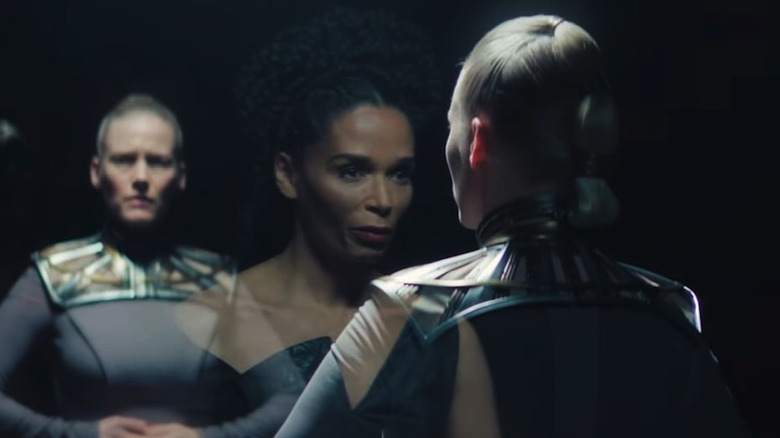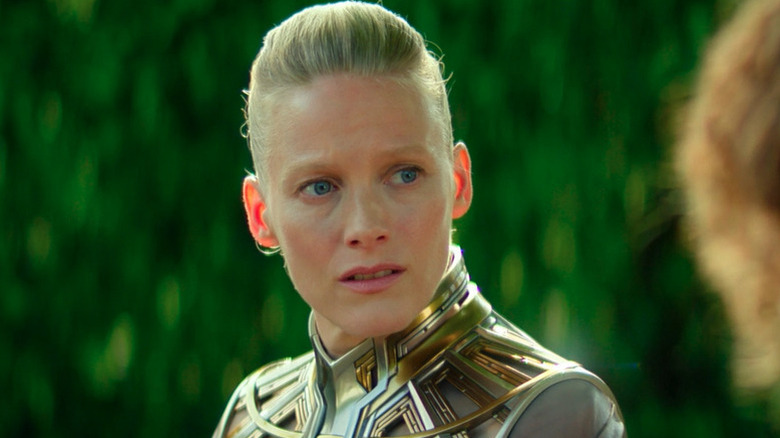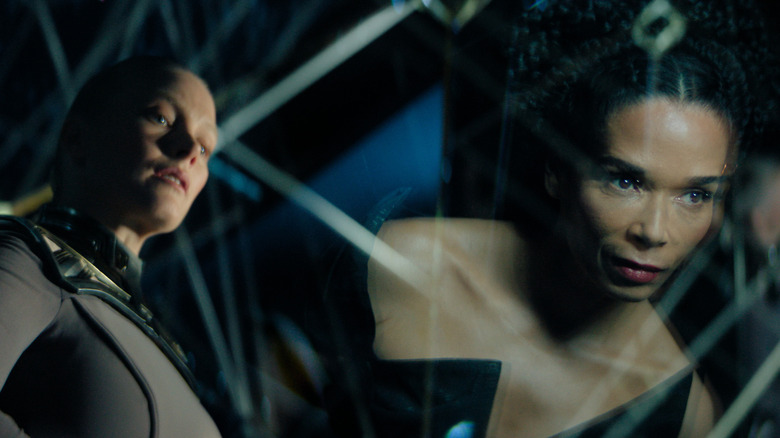Robots To Think With: Foundation Season 3's Deductive Robots, Explained
This article contains spoilers for "Foundation" season 3.
By the end of "Foundation" season 3, the Galactic Empire is in free fall, the First Foundation is in flux, the Second Foundation is ascendant, and the Mule has been revealed (with a twist). One overlooked but important development from this action-packed season, though, didn't come in the finale. It quietly snuck into a conversation in the penultimate episode, "The Paths That Choose Us."
Toward the end, Demerzel (Laura Birn) enters the very important Galactic Library, where she has a meeting with Kalle (or whoever Rowena King's character actually is). As Demerzel struggles to compute how to help the Second Foundation while knowing it's a threat to the Empire she serves, Kalle summarizes the struggle, saying:
"The whole thing is a computer's nightmare. You know you can help the Second Foundation because you will have. What should be the output is now the input, and you fall through the loop of paradox."
Demerzel, clearly in distress, breaks down how she doesn't know if the paradox will "satisfy my programming." She doesn't understand her conflicting motives in the situation, and basically, she's second-guessing everything. At this point, Kalle says that both motives are an option, and a deferred betrayal is the best choice. Demerzel seems satisfied and relieved by the idea. Then Kalle says something very interesting:
"See how it helps to have someone to think with? This is as it should be."
The casual point, made to a robot, likely from a robot, immediately recalls a scene from one of Isaac Asimov's books, but I'm not talking about a "Foundation" novel.
The idea of robots thinking together is classic Asimov
In the book "Robots and Empire," two robots named R. Giskard Reventlov and R. Daneel Olivaw work together to develop the innovative and positronic brain-bending Zeroth Law. This is the fourth Law of Robotics that comes before Asimov's famous three original legislative declarations (robots don't hurt humans, obey humans, and protect themselves, in that order). The Zeroth Law allows robots to harm humans, but only in the defense or pursuit of the larger tapestry of humanity.
The robot Daneel Olivaw, who helps develop this law, is actually the same being as Demerzel in "Foundation." The character is one of the primary connecting threads between Asimov's Robot novels and his Foundation books. By the time of Foundation in the books, Demerzel is busy applying the Zeroth Law, but the robot didn't come up with that complex reading of the traditional Three Laws of Robotics on its own. It (I say "it" at this point because in the books Demerzel is portrayed as a man, in the show as a woman) did so with the help of the robot Giskard Reventlov.
In the book, there are extensive conversations between Giskard and Daneel as they establish what the Zeroth Law could be, decide if they can adopt the law, and then learn how to apply it. This makes the scene between Kalle and Demerzel a classic Asimov moment where robots learn by "having someone to think with."
Is Kalle just a robot, or more than that?
The connection of having a robot to think with is fun, but there's a lingering question in my mind: Is Kalle just another robot talking about positronic "Clasps" and robots communing in true Asimovian style, or is she more than that? I've been wondering this all season. Way back in episode 2, "Shadows in the Math," Kalle escorts the dying Hari Seldon (Jared Harris) through a portal to an unknown location. When he talks about "having skin in the game," Kalle points out that "we can't." Moments before that, she initiates the portal with a flicker of red glowing from her eyes. Easy. A robot, right?
But then, Rowena King's character has repeatedly pointed out that she's not quite who we think she is. She tells Demerzel similarly cryptic things in episode 9, pointing out that Hari thought she was the Prime Radiant and saying, "I know what you wish me to be. Like seeks like. Robots were not designed to stand alone."
All the signs point to a robot entity that contains pieces of Kalle and others within her. But it's weird that Kalle was still so cryptic when facing another robot, especially at the end of the season, when all the big "reveals" were happening plain as day. I wonder if that means she's actually a bit more than that. I think this might be our first glimpse of the entity Gaia. Gaia is a living planet populated by humans (guided by robots) who operate as a collective organism. It is where the Mule is from and is really important in Asimov's later Foundation novels and in future seasons of the "Foundation" show. Could Kalle be the first teaser we're getting in the Apple TV+ adaptation of this living planet? It's possible — but the truth is, we won't get a solid answer until the now-greenlit season 4 shows up in our streaming queues. Start the countdown.
"Foundation" season 3 is streaming on Apple TV+.


